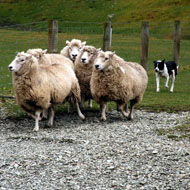
National Sheep Association hits back at "anti-farming lobby"
The National Sheep Association (NSA) has hit back at claims that sheep farming is to blame for floods in parts of the UK.
Journalist and environmentalist George Monboit upset farmers after his report on BBC's Countryfile claimed that hooves compacting soil and the removal of vegetation, had contributed to the floods.
“Sheep in the hills cause floods in the flood plains,” he said.
But Phil Stocker, NSA Chief Executive, said: “The suggestion that our uplands should be used to hold and store water and that sheep farming not only prevents this but makes the situation worse is unfounded and irresponsible.
"The anti-farming lobby conveniently chooses not to mention that many of our lowland drainage systems are centuries old and that our wildlife has evolved in line with the farming and land practices over this period. They ignore the fact that many of these drainage systems have fallen into disrepair – often on purpose with the aim of creating habitat museums. They also ignore the fact that so much of our land area is concreted and tarmacked with no water holding management.
“Sadly BBC Countryfile chose this subject to give airtime to George Monbiot’s ‘dreams’ at a time when global needs are about using our natural capital wisely to feed a growing population, using fewer resources in doing so and improving our environment at the same time.
"Times change and we are disadvantaged by often only seeing with one’s own lifetime. It was only six or seven years ago that our uplands were far more industrious than they are now, yet in this era we seem to be constantly trying to make parks and museums of them instead.
“Of course there is no one size that fits all solutions – we need to protect the carbon stored in our peat-lands, we need trees, we need to manage our water far more carefully – but we also need to feed ourselves, protect our agricultural diversity and consider people and rural communities in all of this.”
The NSA said there is a strong symbiotic relationship between a healthy, successful rural population in the remote hill and upland areas of UK and a thriving, viable sheep sector.
For the NSA’s The Complementary Role of Sheep in Less Favoured Areas report click here



 HMRC has invited feedback to its communications regarding the employment status of locum vets and vet nurses.
HMRC has invited feedback to its communications regarding the employment status of locum vets and vet nurses.